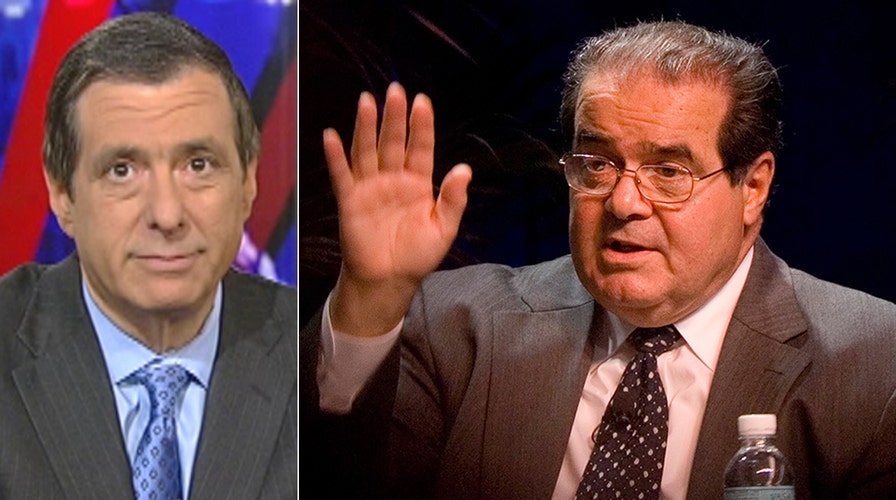Kurtz: Predictable partisanship over Supreme Court
'MediaBuzz' host Howard Kurtz reacts to media coverage in the wake of Justice Scalia's death
This is the kind of Washington hypocrisy that should make everyone cringe.
In the immediate aftermath of Antonin Scalia’s death, Democrats and Republicans, along with liberal and conservative commentators, are making arguments that are parsed as principled, but really naked partisanship.
They are taking positions that they would reverse in a heartbeat if the Supreme Court vacancy occurred under mirror-image circumstances. In fact, many of them have taken the opposite stance in the past.
So the high-minded rhetoric really rings hollow.
What troubled me initially is that there was no decent interval—indeed, no interval at all—between the announcement of the 79-year-old jurist’s death and the online debate over what should happen to his seat. That seemed disrespectful, but it’s the world we now live in.
President Obama says he will nominate a successor. Mitch McConnell says don’t bother, the Senate won’t be voting on a nominee because we want to wait for the next president. Both sides are invoking the Constitution.
But it’s easy to see through the pretense.
Here’s Chuck Schumer, the incoming Senate Democratic leader, saying of McConnell: “He doesn’t even know who the president’s going to propose and he said, ‘No, we’re not having hearings; we’re not going to go forward to leave the Supreme Court vacant at 300 days in a divided time.’”
And as the Daily Caller noted, here’s Schumer in July of 2007, saying Senate Democrats shouldn’t allow George W. Bush to fill any future Supreme Court vacancies “except in extraordinary circumstances”:
“We should reverse the presumption of confirmation. The Supreme Court is dangerously out of balance. We cannot afford to see Justice Stevens replaced by another Roberts, or Justice Ginsburg by another Alito.”
And here’s McConnell, as noted by Daily Kos, saying in 2005:
"The Constitution of the United States is at stake. Article II, Section 2 clearly provides that the president, and the president alone, nominates judges…
"The Republican conference intends to restore the principle that, regardless of party, any president's judicial nominees, after full debate, deserve a simple up-or-down vote.”
Does anyone seriously doubt that if the vacancy occurred now with a Republican in the White House and Democrats controlling the Senate, each side would be making the opposite argument?
As SCOTUSblog points out, the Senate has confirmed numerous high court nominees in election years, under William Taft, Woodrow Wilson, Herbert Hoover and FDR. Ronald Regan nominated Anthony Kennedy on Nov. 30, 1987, and a Democratic-controlled Senate confirmed him, 97 to 0, on Feb. 3, 1988. (In fairness, it would have been hard for the Democrats to do nothing since they had blocked Reagan’s previous nominees, Robert Bork and Douglas Ginsburg.)
This reminds me of filibusters. The majority says the tactic thwarts the will of the people until they find themselves in the minority, at which point it becomes an important tool for democracy. By the way, Senator Obama joined a Democratic effort to filibuster Samuel Alito in 2006 as “somebody who is contrary to core American values, not just liberal values,” even as he criticized the technique.
The punditry has been just as predictable. Here is John Yoo, the former Bush Justice Department official, in National Review:
“Republican senators and the presidential candidates should reject the claim that they have an obligation to fill Justice Scalia’s vacancy before the election...The Senate can confirm, reject, or just sit on the nominee, just as it can with any other proposal from the executive branch.”
And here is the liberal case at Salon:
“In an astounding display of partisan pettiness that is low even for their bottom-feeding standards, Republicans came together as one within hours of Justice Antonin Scalia’s death to register their outrage that this Barack Obama fellow dare suggest he should nominate a replacement, just because the Constitution, which every conservative swears he sleeps with under his pillow at night, says he should.”
As a matter of political optics, I don’t know why McConnell didn’t wait until the president came up with a name. Then the Republicans could have come up with reasons why they opposed that nominee, instead of looking obstructionist by saying they’d block anyone for Scalia’s seat.
Oh, and there is one more layer of hypocrisy here.
Presidential candidates usually proclaim that they want to name justices who agree with their philosophies, but wouldn’t dream of imposing a litmus test.
Yet John Roberts, who promised the Senate he would call balls and strikes, is now a reviled figure on much of the right because of his role in a pair of rulings upholding ObamaCare.
Never mind that he has built a largely conservative record as chief justice. Never mind that the legal issues before the court were not whether ObamaCare is a good program but, for instance, whether Congress meant for the subsidies to be available through the federally run marketplace or only on exchanges established by the states. (Scalia dissented on both decisions.)
So do those who complain about judicial activism really want politically determined outcomes, rather than conservative or liberal judges attempting to honestly interpret the law?
The GOP gamble here is that if Republicans win the election, the new president can name someone who would preserve the court’s 5-4 balance by filling Scalia’s considerable shoes. The risk is that the Democrats win and Hillary Clinton gets to nominate a justice even more liberal than Obama can under the current circumstances.
For all the lofty talk, this is a bare-knuckled fight about which party in effect controls the Supreme Court.





